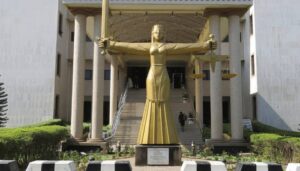In a recent development that underscores the government’s intensified crackdown on crime and terrorism, a Federal High Court sitting in Abuja has sanctioned the detention of an Assistant Superintendent of Police (ASP) and 19 other suspects for a period of 30 days. This ruling, granted at the request of the Defence Intelligence Agency (DIA), aims to facilitate a comprehensive investigation into the alleged involvement of these individuals in serious criminal activities, including banditry, kidnapping, and terrorism.
The decision, handed down by Justice Peter Lifu, represents a significant step in the ongoing efforts to combat the escalating threats posed by terrorist groups and criminal elements in the country. According to the DIA, the detention of the suspects is necessary to allow its operatives ample time to delve deeply into the allegations and gather critical evidence. This investigation is expected to unearth more details about the networks and operations of these criminal groups, which have been a major source of insecurity in various parts of Nigeria.
 The ASP in question, whose name has not been disclosed, was reportedly apprehended in June 2024. Since his arrest, he has been held in the custody of the DIA, signaling the seriousness with which the authorities are treating this case. Allegations against him are severe, as he is accused of collaborating with notorious terrorist organizations such as Boko Haram, bandits, and the Islamic State’s West Africa Province (ISWAP). These groups have been responsible for numerous attacks, abductions, and killings, leading to widespread fear and disruption across several states. The involvement of a serving police officer in such activities, if proven, points to a disturbing breach of trust and highlights the challenges facing the security agencies in rooting out internal corruption and collusion.
The ASP in question, whose name has not been disclosed, was reportedly apprehended in June 2024. Since his arrest, he has been held in the custody of the DIA, signaling the seriousness with which the authorities are treating this case. Allegations against him are severe, as he is accused of collaborating with notorious terrorist organizations such as Boko Haram, bandits, and the Islamic State’s West Africa Province (ISWAP). These groups have been responsible for numerous attacks, abductions, and killings, leading to widespread fear and disruption across several states. The involvement of a serving police officer in such activities, if proven, points to a disturbing breach of trust and highlights the challenges facing the security agencies in rooting out internal corruption and collusion.
During the court proceedings, S.A. Aminu, counsel for the Defence Intelligence Agency, made a compelling case for the extended detention of the suspects. Arguing in favor of the ex-parte application, Aminu initially sought the court’s permission to detain the individuals for a period of 90 days. This request was based on the complexity and gravity of the investigation, which Aminu argued required a substantial amount of time to ensure thoroughness and accuracy. However, Justice Lifu, while acknowledging the gravity of the situation, decided to approve a 30-day detention period. This decision strikes a balance between the need for a detailed investigation and the rights of the suspects, ensuring that the process adheres to legal standards and principles of justice.
The detention order is a clear indication of the judiciary’s support for the ongoing efforts by security agencies to clamp down on terrorism and other related crimes. It sends a strong message that those involved in aiding and abetting terrorist activities, regardless of their position or status, will face the full weight of the law. This move is expected to bolster the morale of security personnel and reassure the public that the government is committed to restoring peace and order.
The involvement of the Defence Intelligence Agency, a key arm of Nigeria’s national security apparatus, highlights the high-level attention being paid to this case. The DIA’s role in gathering intelligence and coordinating operations against threats to national security is crucial, and its involvement in this investigation underscores the seriousness with which these allegations are being treated. The 30-day detention period will provide the agency with the necessary time to conduct in-depth interrogations, analyze evidence, and possibly unravel more extensive networks of collusion that may exist within and outside the security forces.
As the investigation unfolds, the public and various stakeholders will be keenly watching for further developments. The outcome of this case could have far-reaching implications for the fight against terrorism in Nigeria, particularly if it leads to the exposure and dismantling of support networks that have enabled these criminal groups to operate. The Federal High Court’s decision, therefore, marks a significant milestone in the ongoing battle to secure Nigeria and protect its citizens from the scourge of terrorism and violent crime. The actions taken in the coming weeks will be critical in determining the direction of the government in handling these issues.




